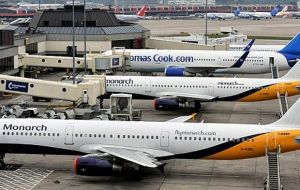MercoPress. South Atlantic News Agency
Thomas Cook goes bankrupt, leaves passengers stranded and workers jobless
 The repatriation of stranded Thomas Cook passengers will be far worse than that of Monarch two years ago.
The repatriation of stranded Thomas Cook passengers will be far worse than that of Monarch two years ago. The British 178-year-old Thomas Cook Group Plc. tour operators have filed for bankruptcy in the United Kingdom, leaving some 600,000 tourists stranded at their holiday destinations, which has prompted the government to launch a massive airlift to bring them back home using 45 chartered airliners.
After talks with creditors failed early Monday, vacationers were gripped by panic all over Europe and beyond. The UK government has said it would work to return stranded passengers back home over the next two weeks in an exercise dubbed Operation Matterhorn, which will cost about 75 million pounds (US$ 93 million), according to an airline industry analyst who estimated the “largest repatriation in peacetime history” to bring home more than 150,000 people will be roughly 50% more expensive than a similar deployment after the demise of Monarch Airlines two years ago.
Those who have reached their destinations were urged to stay in place and continue their vacations, with the government saying it’ll cover the cost of accommodation and their return home around the scheduled time. Bookings are covered by the Air Travel Organizer’s License program, or ATOL, which provides insurance against travel disruptions, it was reported.
The financial handlings put over 21,000 jobs at risk, after months of talks with its investors, led by Fosun Tourism Group. The Chinese company, which owns the Club Med resort chain, proposed a $1.1 billion bailout in exchange for control of Thomas Cook’s tour operations and a minority stake in its airline.
The demise of the brand which has helped create the package tour industry, will have sweeping effects across the entire European and North African tourism industry and elsewhere, as hotels are worried about being paid and confirmed bookings for high-season winter resorts in the nirthern hemisphere were suddenly in doubt.
In the United States, Thomas Cook has filed for Chapter 15 bankruptcy protection to safeguard itself against legal action by US debtholders. The filing, on Tuesday, gives UK law primacy over the company’s bonds held in the US, which should allow it to proceed with its planned restructuring.
Chapter 15 is a modification to the Bankruptcy Code by the Bankruptcy Abuse Prevention and Consumer Protection Act of 2005. It is the US domestic adoption of the Model Law on Cross-Border Insolvency promulgated by the United Nations Commission on International Trade Law (“UNCITRAL”) in 1997.
The company is trying to secure a £900m rescue deal to keep it from going under before it hits its cash-low winter period.
On Monday, Thomas Cook delayed until next week two crucial hearings in the UK at which creditors will vote on the restructuring, pushing it close to its planned finalisation of the deal in October by which time it will need funds in order to buy hotel capacity for next year’s holiday season.
Thomas Cook is the highest-profile casualty of a shift in the travel business, which features low-cost airlines and online booking platforms.
In Canada, Transat Inc. was also hit by the waves after a partnership between them and Thomas Cook died Monday. The tour operator, which runs Air Transat, was in the second year of a seven-year deal to exchange aircraft with the British company’s airline on a seasonal basis.
The Montreal-based company was slated to receive at least seven jetliners from Thomas Cook this fall, but “the partnership is dead because the company no longer exists,” said Transat spokesman Christophe Hennebelle.
He said Transat, which is working to complete its takeover by Air Canada next year, is “confident” the Airbus A321 planes will still come through, but is nonetheless making contingency plans.
“We’re not waiting until the last minute. We’re working to receive the planes, and at the same time we’re thinking of other plans to make sure that the schedule will be respected,” Hennebelle said.
About 600,000 travellers were stranded across the world Monday after Thomas Cook collapsed, immediately halting almost all its flights and hotel services and laying off all its employees as the company ceased trading.
Meanwhile, the shocking news is not believed to be affecting Gibraltar-based businesses very much, it was reported.




Top Comments
Disclaimer & comment rules-

-

-

Read all commentsDunkirk 2.0
Sep 23rd, 2019 - 08:06 pm 0Courtesy of BoJo
Brexit is just beginning...
600,000 can't be right. That's getting on for 1% of the population, to be on holiday at the same time, out of season and with only one tour operator?
Sep 24th, 2019 - 10:36 am 0Must be all them Engrish chavs and pregnant chavettes on benefits that turnip golfcronie luuuuuvs sooo much...
Sep 24th, 2019 - 08:44 pm 0Commenting for this story is now closed.
If you have a Facebook account, become a fan and comment on our Facebook Page!